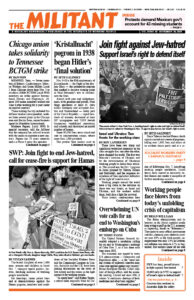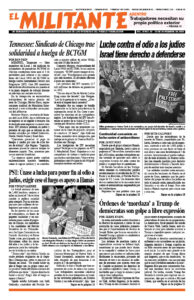November 23, 1998
MONTREAL — During the first week of their speaking tour in Canada that started November 1, two young Cubans, Juan Carlos Frómeta and Raiza Rodríguez, met with more than 200 students on campuses here, and 50 delegates at a meeting of the Montreal council of the Confederation of National Trade Unions (CSN).
Frómeta and Rodríguez explained the crisis that was provoked in Cuba by the loss of trade on favorable terms with Eastern European countries and the Soviet Union. One impact has been to expand tourism, “which has some very serious consequences,” Frómeta said.
Mass organizations are leading campaigns to politically counter these effects. “The majority of workers in tourism give a part of their tips for social activities,” he said. “In this way we raised more than a million dollars for the fight against cancer.”
November 23, 1973
Across the country the heat is being turned down. And that is in keeping with the spirit of the “energy crisis.” For the energy crisis is a profit-gouging fraud from top to bottom. The main aim of the oil majors is to drive smaller gas retailers out of business. Drive up the wholesale prices and bankrupt the retailers.
Business Week reports that oil industry profits for the third quarter of 1973 were up 63 percent on a 36 percent gain in sales. Exxon’s profits were up 81 percent and Gulf’s up 91 percent. To get at the truth about the “energy crisis,” consumer groups and the union movement should demand that the oil companies’ books be opened for inspection.
It’s time to tear away the mask of secrecy in the oil business. The trusts should be taken out of the hands of the Rockefellers and the others and nationalized under workers’ control.
November 22, 1948
America’s imperialist policy-makers are acutely alarmed over the staggering military reverses suffered by the Chiang Kai-shek regime. The impending downfall of the Chinese Franco is viewed by American Big Business as nothing less than a calamity.
At the end of World War II, American imperialism decided to under-write Chiang’s regime. With this despot in power, American Big Business saw China, the richest prize of the war, converted into an American colony. But their calculations went awry. Not even American gold and bullets could save Chiang from the disastrous consequences of his rule.
The popular rebellion has grown in scope and intensity. The difficulties faced by Chiang’s armies are immeasurably heightened by the hostility of the population. Washington’s support of Chiang has aroused bitter hatred of America among the Chinese people.

